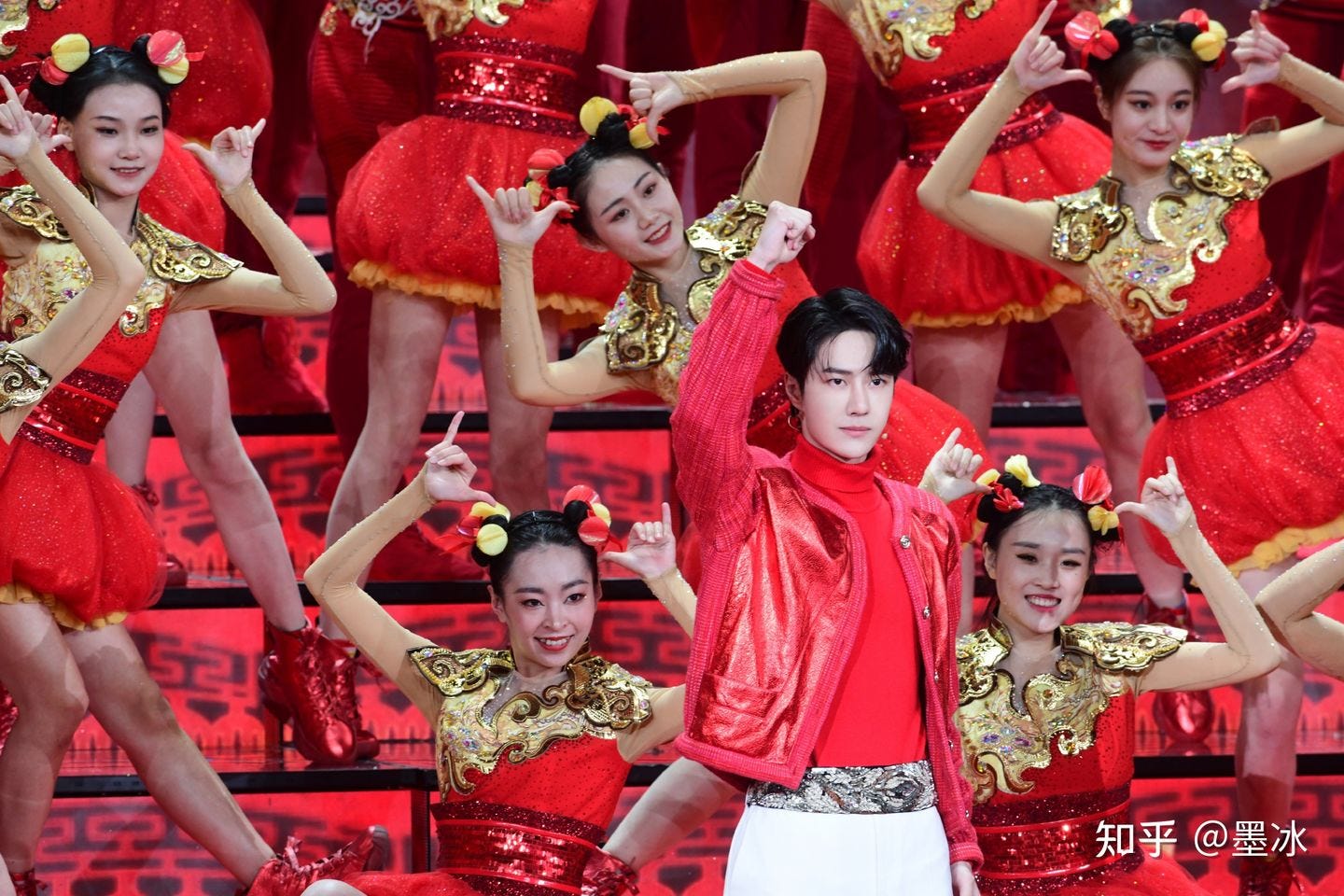Luxury, Livestreaming, and Lots of Lucky Money on CCTV’s Spring Festival Gala
Plus: Wong Kar-wai goes “Where the Heart Leads," a holiday box office boom, and winners in the staycation economy.
Published three times per week, the Content Commerce Insider newsletter highlights how brands create content to drive revenue, globally. If you have received our newsletter from a friend or colleague, we hope you will subscribe as well and follow us on LinkedIn and Instagram.
State broadcaster CCTV’s annual Spring Festival Gala, which airs on the eve of the Lunar New Year, has become a Chinese holiday tradition over the past four decades. Entrenched as a backdrop for family gatherings across the country, the hours-long mix of singing, dancing, comedy, and more commands the biggest audience of any televised program in the world — this year’s edition, which aired on February 11, drew 1.14 billion viewers, or nearly 12 times the number that tuned in to the Super Bowl a few days earlier.
With such a large captive audience, brands are keen to get a share of the attention. Since 2015, this has largely played out through the “hongbao wars,” with major tech players vying to draw users to their platforms by sponsoring the CCTV gala and giving away digital red envelopes (红包, hongbao) to viewers in an internet-age spin on the holiday tradition of elders and bosses gifting packets of cash to younger generations.
This year, lead sponsor Douyin distributed a record RMB 1.2 billion ($186 billion) during the show, topping rival Kuaishou’s 2020 RMB 1 billion ($155 million) giveaway. It reported an astounding 70.3 billion hongbao interactions during the gala, with 2.1 million viewers winning red envelopes in amounts ranging from RMB 66 ($10) to RMB 2021 ($330). Douyin’s sponsorship was aimed at helping to promote its new mobile payment platform, Douyin Pay, which was launched just last month, as it moves to expand the e-commerce side of its content-commerce equation and draw additional interest for a potential IPO.
Social commerce platform Pinduoduo had been announced as the red envelope sponsor of the CCTV gala last September, but was forced to withdraw following the deaths of two employees in early January and a subsequent PR crisis over its work culture of brutally long hours. But the company still found a way to raise its profile by outspending all the other tech players this holiday season with a whopping RMB 3 billion ($460 million) in red envelopes to encourage shoppers on its platform to purchase produce and other agricultural products. That move could help it get back into Beijing’s good graces as the central government has been striving to promote the use of e-commerce to help pull rural Chinese out of poverty.
The theme of poverty alleviation was also a prominent part of Alibaba’s participation in this year’s CCTV Spring Festival Gala, with Taobao serving as the second-billed sponsor after Douyin. Taobao’s top-selling livestreamer Viya, who sold a total of RMB 31 billion ($4.8 billion) worth of goods via livestreaming in 2020, played a starring role on CCTV’s pre-show, “Spring Festival Gala GO Youth” (春晚 GO 青春), the first time that e-commerce livestreaming was integrated so prominently into CCTV’s gala. Viya’s four-hour broadcast combined celebrity appearances with a heavy emphasis on promoting agricultural goods, connecting with younger audiences, and setting Viya up as a model for the livestreaming industry following a series of recent scandals and calls for greater regulation of the sector.
CCTV’s efforts to draw more Gen Z and millennial viewers to its show saw its lineup shift from middle-aged singers and comedians towards young idols and celebrities with large fan bases (known as “traffic stars” in Chinese). Accompanying the fresh new faces on stage was luxury fashion, with guests tending to prefer the global houses they represent as spokespersons and ambassadors, such as Wang Yibo in Chanel, Li Xian in Zegna, and Ni Ni in Gucci (her white coat stood out amid the sea of red and was a huge hit on social media).
But the event was also a showcase for China’s homegrown luxury brands, with top celebrities such as Jackson Yee and Yang Mi respectively choosing Sankuanz and Guo Pei. Whether the brands were foreign or domestic, the color red was a unifying element in the styles chosen. The future of Chinese luxury was represented with a fashion show segment that incorporated virtual reality and celebrities and guochao (“national trend”)-style outfits designed in a collaboration between the couture brand Heaven Gaia and students from the Beijing Institute of Fashion Technology.
Though it is arguably the most mainstream entertainment around, the Spring Festival Gala regularly sparks controversies as well. This year viewers in China were dismayed by sexist jokes mocking women without make-up and derogatory references to unmarried people, and particularly the “leftover women” who fail to land a spouse by the age of 27. International audiences and some Chinese viewers also called attention to the use of blackface to represent Black Africans during one performance, repeating an offense that drew outcry during the 2018 show.
Mentioned in today’s newsletter: Chanel, Clubhouse, Coca-Cola, Disney, Douyin, Gucci, Guo Pei, Huanxi Media, Kuaishou, McDonald’s, Mercedes-Benz, Nike, Pinduoduo, Porsche, Sankuanz, WeChat, Zegna.
Brand Film Pick: Wong Kar-wai Curates for Mercedes-Benz
Luxury automakers are some of the leading producers of branded films for the Spring Festival, appearing to spare no expense to engage top-tier directors, screenwriters, and actors to create compelling narratives that will resonate with viewers and establish strong brand associations with the highest quality storytelling.
Staying true to this tradition for the Year of the Ox, Mercedes-Benz tapped Wong Kar-wai to produce and serve as the lead director for its latest offering, “Where the Heart Leads” (心之所向), a series of three overlapping vignettes that portray the brand as a suitable choice for urban Chinese consumers from a variety of backgrounds — from a millennial couple working in the new economy (beauty blogger and game developer) to middle-aged small business owners to a “second-generation rich” Gen Zer and her grandfather.
The slickly shot film leans towards the commercial, with prominent placement of Mercedes-Benz vehicles, including high-speed action shots and depictions of features, and deploys familiar holiday themes of family, love, togetherness, and celebration. But it also includes subtle nods to tradition, the challenges of the past year, and Mercedes-Benz’s own Chinese brand slogan.
Yet the all-around top-tier production, which includes cinematography by Peter Pau (“Crouching Tiger, Hidden Dragon”), music by singer-songwriter Hanjin Tan, and a series of promotional posters by graphic artist Huang Hai, perhaps created outsized expectations for more than what is ultimately a very fancy car ad.
News From China
China’s box office roars back to full speed. Faced with an increase in reported cases of Covid-19 in clusters around the country, the Chinese government strongly discouraged travel during this year’s Spring Festival, sharply curtailing what’s often referred to as the largest annual human migration. But that doesn’t mean that citizens are staying locked down in their homes for the holiday. Even with theater capacity limited to reduce the spread of illness, the first days of the Year of the Ox saw some record-breaking box-office performances.
The first day of the Lunar New Year, when the biggest films make their debuts, set a new single-day box office record — not just for China but for any single market in the world — of RMB 1.7 billion ($263 million).
The Friday-to-Sunday weekend was the biggest in Chinese history, with takings of nearly RMB 5 billion ($775 million). It also marked the first time China’s box office broke the billion-yuan mark for three consecutive days — and that was with a maximum theater capacity of 75% in most of the country, with certain cities, like Beijing, reduced to 50% ahead of the busy holiday season.
The action-comedy “Detective Chinatown 3” (唐人街探案 3), which had originally been scheduled for release during last year’s Spring Festival, led the pack of seven Lunar New Year releases. Its three-day weekend gross totaled RMB 2.57 billion ($398 million), setting new records as well. It both outgrossed the 2019 China debut of “Avengers: Endgame,” and can claim the title of biggest opening weekend ever in a single market, outpacing the $357 million North America debut of “Endgame.”
Chinese productions accounted for all of the major releases during this weekend, in keeping with the standard practice of blocking foreign film premieres during the peak moviegoing periods. And with the strong appetite for domestic films, Hollywood’s role in China could shrink even further in the future. Already in 2020, only 16% of box office receipts came from imported films, compared to 36% in the previous years.
Other winners in the “staycation Spring Festival” economy:
Online entertainment: Video streamers for movies and TV shows, short video platforms, livestreaming, and gaming.
E-commerce platforms aimed to transform the Spring Festival from a traditional holiday into another major shopping festival with heavy discounts and sales promotions.
Personal services such as pet care, laundry, and ride-hailing saw demand increase by six to ten times over last year’s Spring Festival, according to JD.com.
Products to make home life comfortable, such as massage chairs, window cleaning robots, and fitness equipment. Demand for express delivery services was up 223% year-on-year.
In-home dining, via holiday menu kits, meals for one, and regional specialties ordered online.
Short-haul travel: Driving-distance getaways, visits to local scenic spots, and suburban homestays replaced the typical long journeys back to hometowns and overseas vacations. The island province of Hainan, aka “China’s Hawaii,” was about as far as some people got.
News in English
Clubhouse is reviewing its data protections after the Stanford Internet Observatory reported that it had discovered security flaws that could allow the Chinese government to gain access to user data. Reuters
The chairman of Huanxi Media has ambitions to turn the studio’s streaming platform into China’s Disney+ – emphasizing streaming revenues over box office takings. SCMP
Beijing’s new antitrust rules for internet companies includes an important provision that restricts the market regulator’s power to define a monopoly, a boon for the country’s tech giants. SCMP
With the likelihood of the Summer Olympics taking place in Japan this year dimming, brands are facing a dilemma regarding the 2022 Winter Games in Beijing over human rights concerns. Wall Street Journal
A selection of top Spring Festival campaigns for the Year of the Ox by global giants from Coke to Nike to McDonald’s. Radii
Has the Lunar New Year holiday become overly commercialized by Western luxury brands that are increasingly reliant on Chinese consumers? CNBC
WeChat mini games offer attractive opportunities for luxury brands to reach 500 million monthly active users in fun and innovative ways. Vogue Business
Porsche has abandoned plans to build a manufacturing facility in China, betting that the country’s luxury auto consumers will prefer the cachet of its “made in Germany” brand. Financial Times
The hugely popular idol and brand favorite Wang Yibo is also in Beijing’s good graces with the recent release of a propaganda song celebrating China’s fourteenth five-year plan for economic and political development. Radii
The trendy tea chain Nayuki has filed for an IPO in Hong Kong, shifting gears from previous plans to list in the United States. Caixin
China’s digital advertising market grew by 14% in 2020, bringing its total value close to $77 million. CGTN
Over the past three years, the Belgian city of Liège has been transformed into a launchpad for the Alibaba’s major e-commerce push into the European market. The Guardian
We’ve Got China Covered
China Film Insider: China’s Long-Suffering Film Industry Eyes Big Holiday Box Office
Jing Daily: The Best C-Beauty Campaigns for the Year of the Ox
Jing Culture & Commerce: How K11’s Cultural-Retail Concept Thrived Online in 2020






